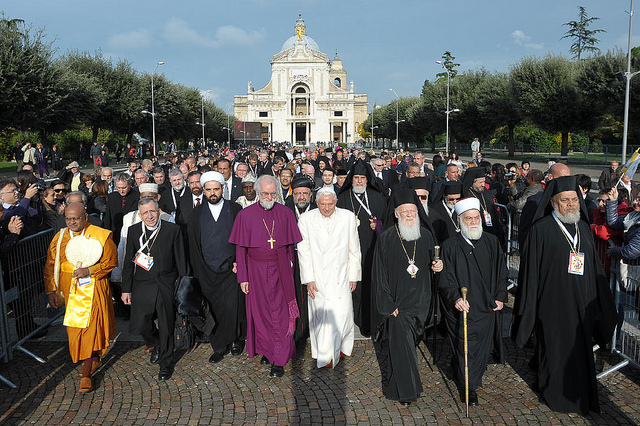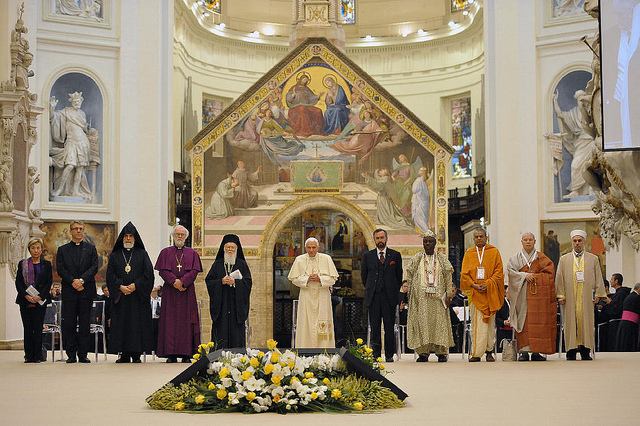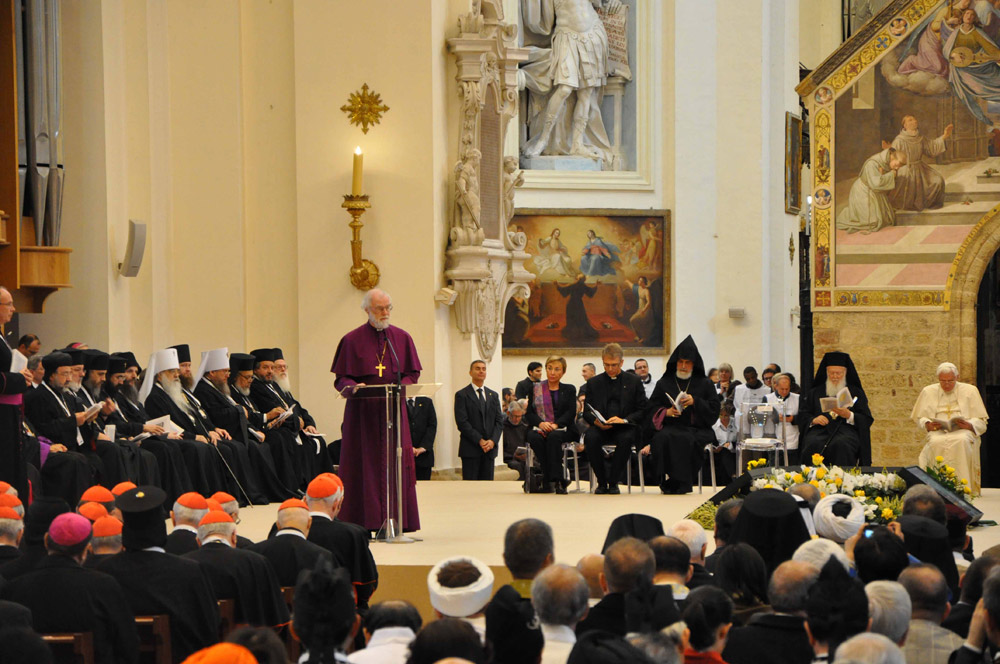Archbishop attends 'day of reflection, dialogue and prayer for peace' in Assisi
Thursday 27th October 2011
Archbishop Rowan Williams joined Pope Benedict XVI at a 'day of reflection, dialogue and prayer for peace' in Assisi on Thursday 27th October.
The event commemorates the 25th anniversary of the historic 'World Day of Prayer for Peace' meeting in 1986, called by Pope John Paul II, which brought representatives of both Christian communities and other traditional world religions together, and which was attended by Archbishop Robert Runcie.
On today's occasion, representatives of Christian communities and of other principal religious traditions were joined by figures from the worlds of culture and science.
The day, which takes as its theme 'Pilgrims of Truth, Pilgrims of Peace', began in the Basilica of Santa Maria degli Angeli, where the Archbishop delivered an address as one of the day's '10 Testimonies for Peace'.
In his address, the Archbishop spoke of the first Day of Prayer for Peace, describing John Paul II as somebody who “believed passionately that the concerns of human beings in our age for justice and stability were matters that demanded a common witness from people of faith, without any compromise of our own particular convictions and traditions”.
Dr Williams called on all people of faith to ‘embody…mutual recognition in true and lasting relationships of friendship’: “The challenges of our time are such that no one religious body can claim to have all the practical resources needed to confront them, even if we believe that we have all we need in the spiritual or doctrinal realm.”
He concluded by saying that “We are here today to declare our will—or rather our passionate determination—to persuade our world that human beings do not have to be strangers, and that recognition is as possible as it is necessary because of our universal relation to God.”
Preceding the addresses, the delegates attended a screening of a short video recalling the 1986 meeting. The last address of the morning was delivered by the Pope.
In the afternoon, a lunch shared by the delegates was followed by a period of silence for individual reflection and prayer, then all those present processed towards the Basilica of St Francis. In the shadow of this building, the day concluded with a solemn renewal of the joint commitment to peace.

The full text of the Archbishop's address follows. The Archbishop also contributed to a commemorative volume presented to the Pope by Franciscans on the day - click here for this text.
Message of The Archbishop of Canterbury at the day of reflection, dialogue and prayer for peace and justice in the world - “Pilgrims of truth, pilgrims of peace” - in Assisi, 27 October 2011
Your Holiness,
Your All-Holiness, Your Beatitudes,
Brothers and sisters in Christ,
Dear friends,
It is a great privilege to stand with you to celebrate the anniversary of the first Day of Prayer for Peace held here under the guidance and leadership of Blessed Pope John Paul II. The late pope believed passionately that the concerns of human beings in our age for justice and stability were matters that demanded a common witness from people of faith, without any compromise of our own particular convictions and traditions. The years since that first assembly have reinforced this belief most strongly. The challenges of our time are such that no one religious body can claim to have all the practical resources needed to confront them, even if we believe that we have all we need in the spiritual or doctrinal realm. So we are here not to affirm a minimum common ground of belief, but to speak out of the depth of our traditions in all their distinctiveness, so that the human family will be more fully aware of how much wisdom there is to draw upon in the struggle against the foolishness of a world still obsessed with fear and suspicion, still in love with the idea of a security based on defensive hostility, and still capable of tolerating or ignoring massive loss of life among the poorest through war and disease.
All such failures of the spirit have their roots largely in an inability to recognize strangers as sharing with us one and the same nature, one and the same personal dignity. Lasting peace begins when we see the neighbour as another self – and so begin to understand how and why we must love the neighbour as we love ourselves.
For the Christian, the heart of all this is the conviction that in Jesus of Nazareth God himself identifies with human nature, and thus with each and every human person. Every human face now looks different because of the fact that God has taken on a human face. What we recognize in our neighbour is someone who not only bears the image of God by virtue of creation, but bears also the possibility of carrying the likeness of Jesus Christ by virtue of the new creation. And if this is so, we cannot ultimately be strangers. What makes for the life of any one person or community makes for the life of all.
All people of faith have in common the conviction that we are not ultimately strangers to each other. And if we are not strangers, we must sooner or later find a way to embody that mutual recognition in true and lasting relationships of friendship. We are here today to declare our will—or rather our passionate determination—to persuade our world that human beings do not have to be strangers, and that recognition is as possible as it is necessary because of our universal relation to God.
I end by quoting some lines from a great Christian poet of my own nation of Wales, Waldo Williams – a teacher, a man of deep prayer and an activist for peace throughout his adult life. He wrote a poem1 called 'What is Man?', and these are the opening verses –
What is it to be alive? To dwell in a great hall
Between narrow walls.
What is it to recognize? To find a single root
Beneath all the branches.
What is it to have faith? To stay still at the hearth
Until we are ready to receive our guest.
What is it to forgive? To find a way through the thorns
To stand alongside our old enemy.
May God help us to answer such questions in such a way by means of our words and our witness.
+ Rowan Cantuar:
1 ‘Pa beth yw Dyn?’ (1952), Waldo Williams (1904—71)

2011 World Day of Prayer for Peace, Assisi. Photo: © Nicola Green
A contribution to the commemorative volume for the day of reflection, dialogue and prayer for peace and justice in the world, 27 October 2011
from Archbishop Rowan Williams, Archbishop of Canterbury
The Spirit of Assisi
For St Francis of Assisi, the condition of all dialogue was poverty. I am not thinking only of the well-known story of Francis’ meeting with the Sultan of Egypt – though that is itself a deeply significant moment, a moment when the encounter of two different religious worlds was suddenly changed into a meeting of human beings. It is true of the whole of Francis’ ministry. Because we cannot speak of dialogue without speaking of listening to the other, and we cannot speak of listening without the acknowledgement of some kind of inner poverty. We need the poverty of silence if we are to hear what the other says; and we need the poverty of recognizing that the other has a gift that we need if we are to be changed by the encounter.
Francis challenges us all to embrace his poverty in whatever way is appropriate for our context. We celebrate his positive attitude to the natural world; but this was not a sentimental affection for beautiful landscape or wildlife. It was a deep openness and attention to what the natural world was saying to God in praise and thanksgiving, just by being itself; it was a commitment to allowing the world to speak without interruption by the human greed for control. This is the spirit in which he composed the Canticle of the Creatures. And, as the final text of the Canticle makes clear, that spirit is also the spirit in which the disciple of Jesus is to encounter even pain and death as places where praise may be heard.
Poverty of spirit in this sense is to be silent so that the other – whether the physical environment or the animal world or the believer in anther faith or the non-believer – may be heard truthfully. It is far from being the silence of uncertainty or relativism. It is grounded in a firm conviction of the absolute reality of God as revealed in the Incarnate Christ – grounded, as Francis’ life shows, in the wounds of the Crucified. It is grounded in the belief that the Christlike love of God is solid and strong enough to live in the face of the most powerful and obstinate contradiction; that the silence of attentive love will bring out the truth and that the truth is not something to be afraid of.
Our Lord gives the name of ‘blessed’ both to those who are poor in spirit and to those who are hungry and thirsty for justice. No-one can doubt that Francis was hungry and thirsty for God’s justice. He knew that to embrace those the world forgets is the clearest sign of the newness of a converted life: remember how he gave a sign of his own conversion in embracing the leper. But in his life the hunger for justice was inseparable form the poverty of spirit – as if God wants to teach us through him that we shall only arrive at God’s justice by the way of silence and setting aside the noisy urge to power.
When we meet at Assisi, we need to listen to Francis and to ask his prayers. We need in our dialogue the courage to be quiet together – not because we have nothing to say, no truth to share, but because we are gratefully aware that Christ has rooted us in his life and prepared for us the encounters in which we shall meet him and recognize him afresh in new person and new situations. When we are quiet in the name of Christ, we shall discover that he comes to us in many unexpected ways. And we are delivered from the passionate longing to overcome, even consume, the other so as to protect our control of the situation.
Dialogue, whether between Christian confessions, between faiths, or simply between persons and their world, must be more than an exchange of courtesies – and equally, more than an exchange of hostile certainties! We have to seek a way of speaking with and listening to each other that allows the logos to come through – the energy and interaction underpinning all created things which is the foundation equally of justice and of contemplation.
Many have remarked how Francis’ vocation was of a kind that no one person can readily reproduce. He was a man whose actions transformed the possibilities of all around him, whose spontaneous service to the whole creation was his life’s blood; and he was a contemplative and visionary, whose intense personal exposure to Christ found physical expression in the stigmata he received on Monte Alvernia. He was a community founder whose calling was rooted in and renewed in solitude. Ever since his death, not only his followers in the order but all who have been touched by his life have struggled to do justice to the whole range of his charism. But what holds his life together, of course, is that in action and in silence he is filled with the logos of God, through his communion with the incarnate Word.
As we encounter one another in Assisi, we must pray for some share in this same communion with the logos. We who are Christians base all our lives and acts and words on the conviction that the logos is once and for all made human in Jesus and that in communion with him there is communion with all persons and things. But this is not a claim that shuts out others or a claim that we have nothing to hear, no life to receive from those whose convictions are different. Because of Christ, and because of his servants and friends like Francis, we can find the courage to embrace poverty and to open our hands to receive. And we do so in the hope and prayer that in such an encounter we may play some small part in God’s constant work of opening up the creation to its depths in his love and beauty.
+ Rowan Cantuar:
